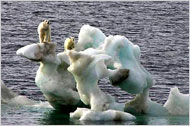WASHINGTON, Sept. 28 — President Bush said Friday that the nations that contribute most to global warming should all set goals for reducing greenhouse-gas emissions. But he did not specify what those goals should be and repeated his stand that nations should not be held to mandatory targets for capping carbon dioxide emissions.
At the close of a two-day meeting here of 16 major carbon-emitting nations, Mr. Bush also proposed an international fund to help developing nations benefit from clean energy technology. He instructed the Treasury Department to begin work on the proposal, but the administration offered no details.
“We will set a long-term goal for reducing global greenhouse-gas emissions,” the president said in a morning speech at the State Department. “Each nation must decide for itself the right mix of tools and technologies to achieve results that are measurable and environmentally effective.”
He added, “No one country has all the answers, including mine.”
The delegates to the conference listened impassively to Mr. Bush’s 20-minute address, interrupting him with applause only once, when he pledged that the United States would participate in global warming negotiations overseen by the United Nations. The Bush administration has been a less-than-enthusiastic partner in United Nations-sponsored climate change talks and has not joined the Kyoto Protocol, intended to halt and then reverse the spread of climate-altering carbon emissions.
Mr. Bush quickly left the auditorium after delivering his remarks, which ended 15 minutes ahead of schedule. Some of the delegates, representing the major industrialized nations plus Brazil, China, India and South Africa, said they were less than impressed.
“The president made his speech,” said the chief Brazilian delegate to the talks, Everton Vargas. “We took note of his speech.”
Mr. Vargas, a senior official in Brazil’s ministry of external relations, seemed puzzled by the purpose of the Washington meeting, which came at the end of a week when the United Nations Secretary General, Ban Ki-moon, pledged the organization’s full efforts toward negotiating a new agreement to take the place of the Kyoto Protocol after most of its provisions expire in 2012.
“The whole agenda was set by the American government,” Ambassador Vargas said. “The American government didn’t bring any new ideas, any new proposals in terms of the American position.”
The ambassador did, however, speak approvingly of the still-vague proposal for a clean technology fund, but said he was unsure about how it would be structured and financed.
The president’s calls for each country to decide for itself how to rein in pollution, and his refusal to embrace mandatory measures, have set the United States apart from other countries, and his appearance at the State Department conference probably did not do much to lessen that isolation.
“Smart technology does not just materialize by itself,” John Ashton, a special adviser on climate change to the British foreign secretary, David Miliband, said afterward. Mr. Ashton, who has said that voluntary measures are ineffective, said “smart technology” requires government commitment and investment.
Mr. Ashton also questioned the purpose of the Washington meeting, saying it had produced nothing of substance.
“We could have another 20 years of talking about talking,” Mr. Ashton said. “We need to start deciding about doing.”
Fred Krupp, the president of Environmental Defense, one of the nation’s largest and most influential environmental groups, addressed the meeting on Thursday and came away discouraged by the lack of tangible progress.
“It was a lost opportunity,” he said. “America needs to lead, and we can lead, but now the spotlight shifts to the Congress because the president has refused to accept the only path that’s ever solved an air pollution problem — and that’s mandatory legal limits.”
There are at least a half-dozen bills before Congress that would set such mandatory caps, as well as energy legislation passed by the House and Senate that would help curb greenhouse gases, which President Bush has threatened to veto.
Representative Edward J. Markey, Democrat of Massachusetts and the chairman of the House Select Committee on Energy Independence and Global Warming, attended Friday’s speech.
“My fear is that the president has set aspirational goals that are really procrastinational,” he said.















